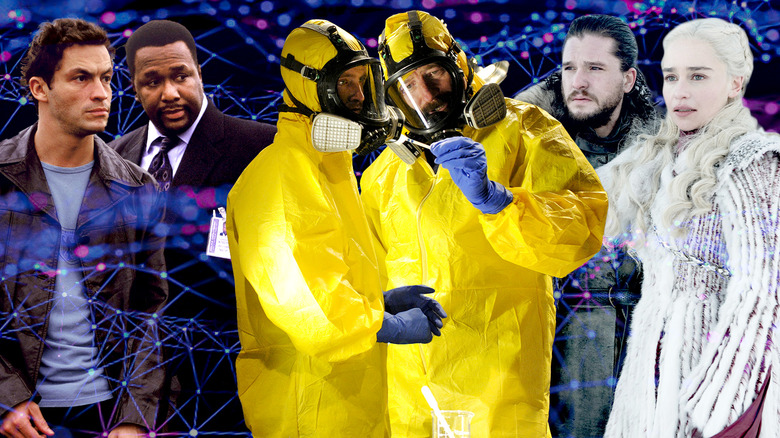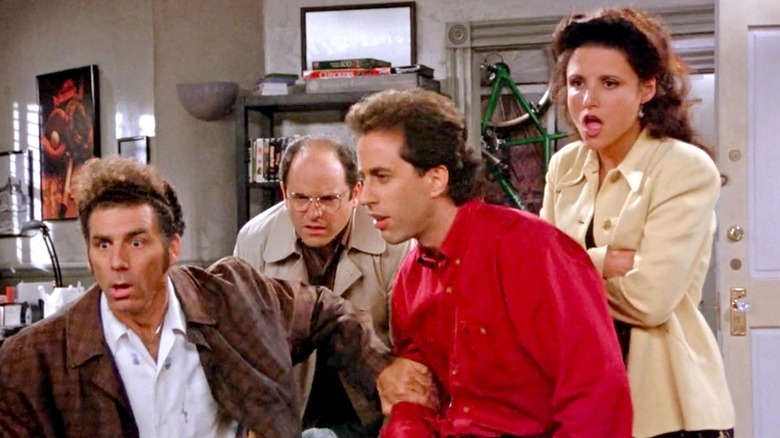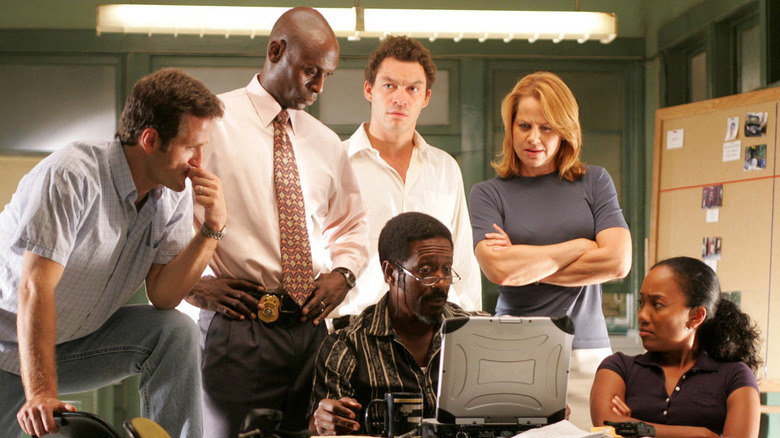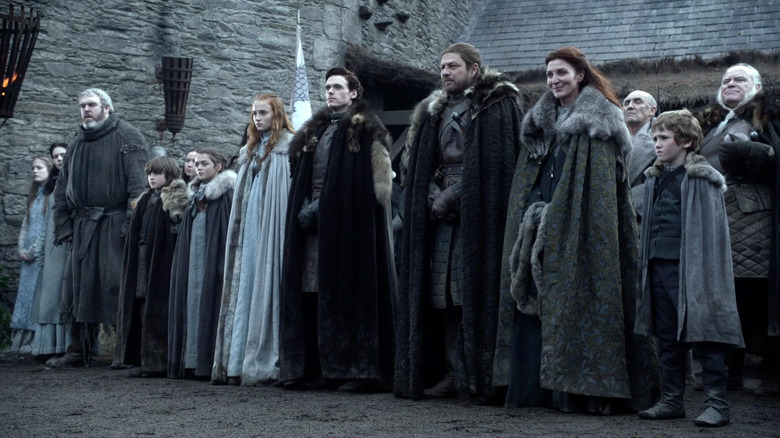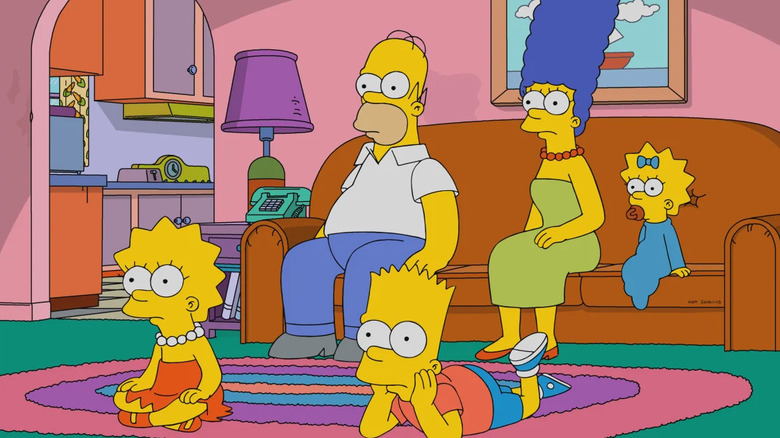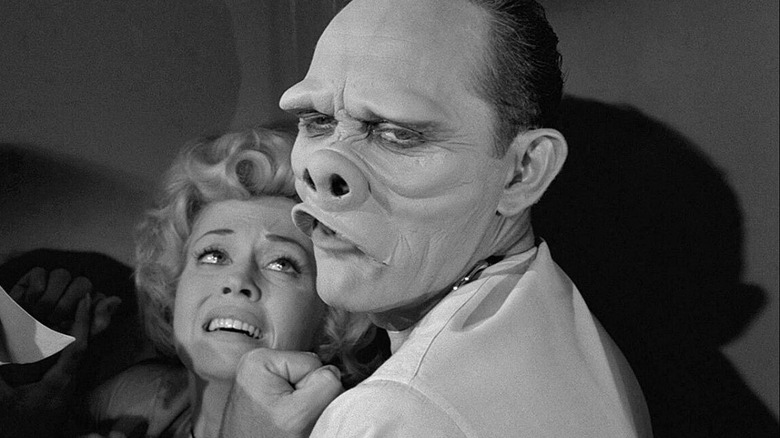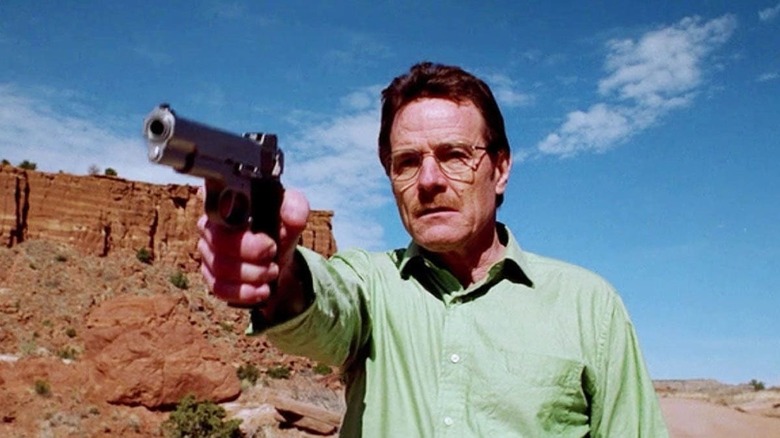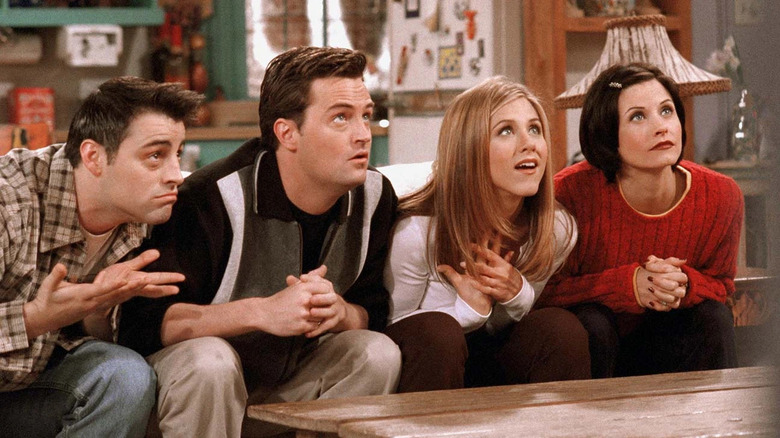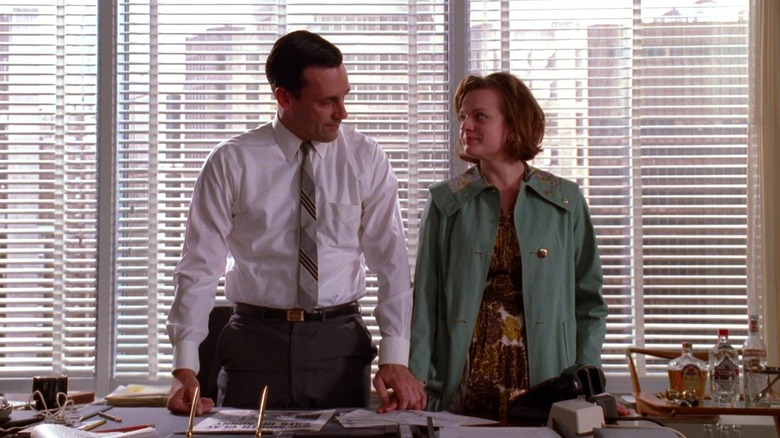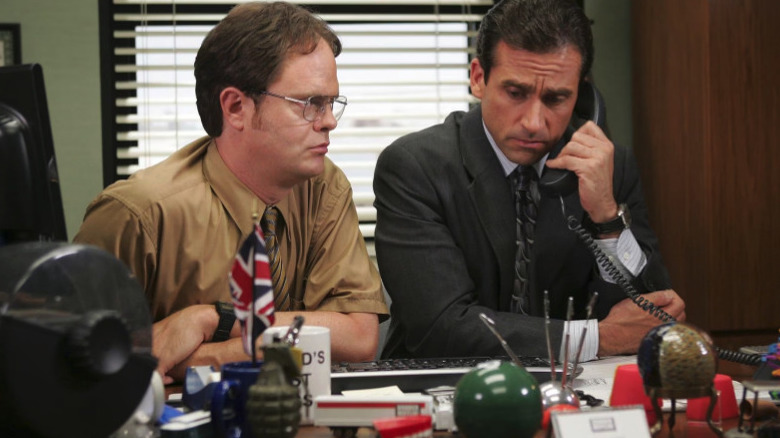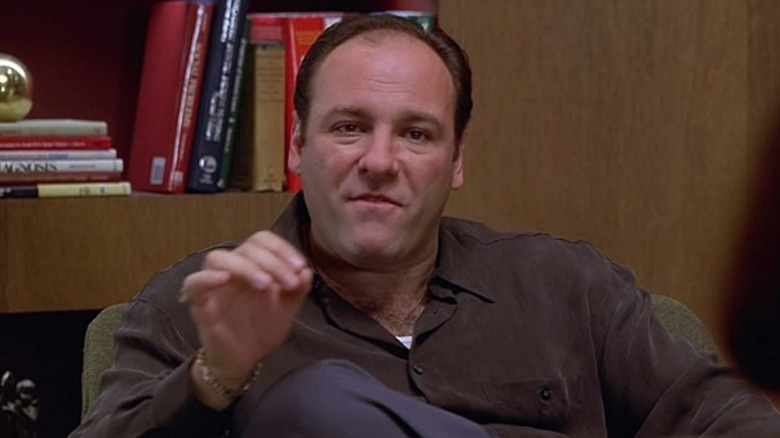The 10 Best TV Shows Of All Time, According To Artificial Intelligence
Over the last few years, we've witnessed rapid advancements in artificial intelligence that have seen it become a critical commercial tool. Today, A.I. algorithms are being used to analyze swaths of data to determine which TV shows our favorite streaming services recommend. So with all that information, we started to wonder what artificial intelligence might think are the best TV shows of all time.
With the use of a commonly available A.I. text generator, we plugged that very question in to see what it thinks, and the results are a top 10 list, based on all of the data it could mine from across the web. Based on our findings, it seems to have used everything from critical reviews and user ratings to viewing habits, audience popularity, and even a show's legacy and cultural impacts. But this is more than a mere fun exercise because by looking at its response we might be able to gain insight into both A.I. and into ourselves, as artificial intelligence is often a reflection of what we've put out into the world.
Sure, maybe selecting the greatest TV shows is something best left to real human critics and fans who can exhibit creativity and inspiration in their picks. But maybe we'll have our own pre-conceived notions of A.I. challenged by a data-driven "best of" list. Or, perhaps we may ultimately find that it's picked the same shows we all agree are the cream of the crop anyway, in which case, it may just prove itself a useful tool.
Seinfeld
If it's not the greatest sitcom ever, "Seinfeld" might be the most influential. For nine seasons, the series laid the foundation for practically every show that would follow, taking the tried-and-true formulas of past sitcoms and turning them on their heads. Named for its star comedian Jerry Seinfeld and created by Larry David, the series revolves around the day-to-day lives of four New Yorkers — Jerry, Elaine, George, and Kramer — a foursome who are today as iconic as John, Paul, George, and Ringo.
Responsible for adding phrases like "no soup for you" and "yada yada yada" to our shared cultural language, as well as bringing the fictional holiday of Festivus to the zeitgeist, "Seinfeld" was meme-worthy before social media existed. It captured the hearts of fans like few others by defying the formulaic conventions, with a focus on the lives of boring, cynical neighbors that proved the old saying, "It's funny because it's true." Today, the series remains a comedy classic that has stood the test of time.
When we asked why it remains one of the best shows ever, though, artificial intelligence agreed. It cited both its iconic characters and its genre-smashing concept that pioneered the "show about nothing." The A.I.'s highly attuned computer brain recognized the show's power to somehow string together hilarious plots revolving around the low-stakes problems of ordinary life, whether that be the struggle to find a parking space or the frustrations of waiting for a table at a popular restaurant.
The Wire
When it comes to flawless television, many audiences and critics will point to HBO's landmark crime drama, "The Wire." Created by David Simon, the series takes a hardened approach to the genre, with gritty stories with often unsympathetic characters who blur the line between good and evil. Impeccably written and brilliantly crafted, the series follows a squad of Baltimore police officers assembled for a wire-tapping task force assigned to root out local drug traffickers.
A captivating series that ran for five seasons across six years, "The Wire" features an ensemble cast that includes Lance Reddick, Dominic West, Michael K. Williams, Sonja Sohn, Idris Elba, Wendell Pierce, and Michael B. Jordan in his first recurring role. "The Wire" is a series that is as thought-provoking as it is thrilling, forcing viewers to re-examine long-held beliefs. Despite its acclaim, however, "The Wire" was rarely recognized during its run, nominated for just a pair of Emmys, though few today — including our A.I. advisor — would doubt its place among the greatest shows of all time.
As for why our artificial intelligence placed it on its list, it called out its complex and nuanced stories, populated by rich, diverse characters like the conflicted Captain Daniels, the violent but honorable Omar, and the morally questionable Detective McNulty. It riffed on the show's ability to sensitively deal with real-world social issues. including homelessness, the war on drugs, police brutality, and systemic inequality; all solid reasons that are backed up by critical reviews.
Game of Thrones
When it comes to sword-and-sorcery on television, the list of greats isn't very long. In fact, "Xena: Warrior Princess" was arguably the best and most well-remembered before "Game of Thrones" came along in 2011. This time, though, it wouldn't be a light-hearted adventure, but a lavishly-produced, dramatic saga as sprawling in scope as any big-budget theatrical release. Based on a series of high fantasy novels by acclaimed author George R.R. Martin, the series is set in the fictional realm of Westeros, where several rival family houses fight for control after an ancient evil re-emerges.
With an all-star cast initially led by "Lord of the Rings" alum Sean Bean, "Game of Thrones" features a cast of future stars that include Maisie Williams, Emilia Clarke, Sophie Turner, Kit Harington, Pedro Pascal, and Bella Ramsey. Full of nail-biting suspense, Shakespearean levels of intrigue, and unpredictable twists and turns, the series quickly became one of the hottest shows on television. It shocked audiences with graphic sex, violence, and shocking stories that left the audience's jaws on the floor week after week for eight solid seasons.
Artificial intelligence attributed the show's longevity and success to its high production value, lush cinematography, and immersive fantasy setting, and credited the show for popularizing fantasy on TV thanks to its deft mix of multi-dimensional characters that turned the genre's more ordinary caricatures into compelling, layered figures. Together, it labeled "Game of Thrones" a grandiose epic that highlights the human cost of political ambition.
The Simpsons
"The Simpsons" debuted in 1989, and follows an ordinary nuclear American family. A cultural phenomenon and a merchandising behemoth in the 1990s, it has since gone on to become the longest-running scripted series in the history of television. Early on, though, it wasn't pegged for long-running success and was even somewhat controversial for its crude language and edgy stories, which may seem tame today but were enough to even rile up the President of the United States.
But within a few years of its debut, "The Simpsons" was one of the biggest shows on TV. From dim-witted middle-aged Homer to rebellious young Bart to cantankerous Marge, brainy Lisa, and pacifier-sucking Maggie, the Simpson clan continues sending audiences into hysterics. But it wasn't just the family, as the larger world of Springfield was populated by offbeat characters that became cultural icons themselves.
And it's not just us who recognizes the greatness of "The Simpsons," but A.I. too. Its machine learning said the series has been able to last more than three decades due to its ability to continue delivering top-notch laughs and adapt to changing times with a wide range of stories focused on its diverse cast of kooky characters And we don't disagree, because staying fresh has indeed been a key to its success. Thanks to unrivaled creativity, it attracted new fans with each passing generation as it remains both relevant and hilarious. Renewed for an eye-popping 36th season, the series is nearly as old as Homer himself.
The Twilight Zone
In the 1950s and '60s, television anthologies were the order of the day, with "playhouse" style shows like "Alfred Hitchcock Presents" and "Goodyear Theatre" just two notable examples. But in 1959, a series unlike any other would hit the airwaves and change television forever. Created and hosted by writer Rod Serling, "The Twilight Zone" was a weekly anthology that mixed stories from just about every genre. With stories contributed by Serling, as well as acclaimed authors like Richard Matheson and Charles Beaumont, the series turned out some of the most famous sci-fi stories in television history.
Airing for more than 150 installments spread across five stellar seasons, "The Twilight Zone" is known for bizarre stories that defy imagination, usually capped off with a mind-numbing twist and, typically, a moral lesson. Confronting social issues and taboo subjects like racism and nuclear war, the series quickly eclipsed its contemporaries and became must-see TV. A number of imitations followed in its wake, but none could match Serling's creation. Its impact on television has been immeasurable, sparking a long-running franchise that includes multiple revivals and even a feature film adaptation.
Groundbreaking for its era, our artificially intelligent series-selector called out the show's ability to explore deep philosophical themes, and for paving the way for later shows like "The Outer Limits" and "Black Mirror." It even noted the show's indelible mark on pop culture, remarking on the countless parodies and loving references in fellow greats like "The Simpsons" and "Seinfeld."
Breaking Bad
The critically acclaimed "Breaking Bad" was created in 2008 by former "X-Files" writer, Vince Gilligan. But the series is no spooky supernatural procedural, instead a dreary drama about Walter White, a high school science teacher who is diagnosed with terminal lung cancer. In his desperation, White teams up with local drug dealer, Jesse Pinkman (Aaron Paul), to raise the money he needs to ensure his family's future. But as he becomes consumed with his life of crime, White slips deeper and deeper down a dark moral hole, eventually becoming a vicious drug lord and cold-blooded killer.
Starring Bryan Cranston of "Malcolm in the Middle" in the role that would make him a superstar, "Breaking Bad" is one of the most gripping dramas of all time, and it kept audiences on the edge of their seat for five stunning seasons. An entrancing, and sometimes downright bleak series, it would snag a whopping 16 Emmys during its run and spawned an equally audacious spin-off, "Better Call Saul," based on the quirky, morally dubious lawyer who aided White in his crimes.
"Breaking Bad" is a tour de force that our A.I. helper said has been widely recognized for its examination of morality. Though its legacy is still being shaped, the series has already been recognized (by artificial intelligence and by human critics ) as one of the key shows that helped usher in a new era of prestige television.
Friends
While "Seinfeld" broke new ground as a sitcom about a group of quirky pals in New York City, "Friends" took that basic idea and ran with it. With a slightly younger cast of twenty-something singles, it focuses more on the relationships between Ross, Chandler, Phoebe, Rachel, Joey, and Monica, and with a bigger emphasis on their romantic foibles. More heartfelt and even downright sentimental at times, "Friends" eschewes the cynicism of its Gen X predecessor in favor of its fun-loving, lighthearted, and free-wheeling Millennial comedy, helping it capture the hearts of a younger generation in the late 1990s and into the 2000s.
An ensemble of mostly newcomers, it launched the careers of David Schwimmer, Matthew Perry, Jennifer Aniston, Lisa Kudrow, and Matt LeBlanc. "Friends" became immensely popular in large part thanks to its will-they-won't-they romance between Ross and Rachel, while the sarcasm of Chandler became its own common lexicon. Nearly unmatched in its popularity throughout its run, it was a ratings juggernaut and became such a success that the stars of the show were being paid a million dollars per episode. Even now, nearly two decades after it came to a close, "Friends" feels almost as popular as it was in its prime, with new audiences discovering it thanks to the magic of streaming.
But with all that has been said about "Friends," there's not much for artificial intelligence to add. But it also mentions its ageless humor and stories of heartache, friendship, career struggles, and family problems, which pretty much everyone can relate to, no matter what generation you are.
Mad Men
Who thought a series set in an advertising agency would wind up being one of the best shows in the history of television? And it's not just an oddball pick from a rogue artificial intelligence, either. No, critics and audiences were raving about "Mad Men" since it first hit the air, and introduced viewers to the suave coolness of Don Draper (Jon Hamm), creative director at Sterling Cooper, a small ad firm in 1960s New York City. Though he may appear in the mold of a Gary Cooper or Cary Grant, the dashing Draper is a deeply flawed man, a married father who never hesitates to woo the women around him. But as the series unfolds we also discover that he harbors a dark secret that, if exposed, could threaten to destroy everything he's built.
But "Mad Men" isn't just about Draper, and focuses as much on the personal and professional lives of those around him as it does the complicated ad man. This includes Draper's young secretary, Peggy Olson (Elisabeth Moss), office manager, Joan Holloway (Christina Hendricks), sniveling salesman, Pete Campbell (Vincent Kartheiser), and arrogant co-founder, Roger Sterling (John Slattery).
Across the show's seven years on the air, "Mad Men" was a critical darling, earning universal acclaim en route to 16 Emmy awards, including best drama, best writing, and best directing, on top of awards handed to several of its stars. With a host of accolades, it set a new standard for cable dramas and turned its lesser-known cast into superstars.
The Office
The only remake to be picked by our artificial intelligence, "The Office" actually began life as a workplace sitcom of sorts over in Britain, the brainchild of comedians Ricky Gervais and Stephen Merchant. But while the original poked fun at the mundanities of a dreary existence — with customary English wit, nihilism, and cringe-inducing nuttiness — its American cousin, from former "The Simpsons" writer Greg Daniels, turned it into something else altogether.
While the series kept the original's mockumentary style, it had an unmistakably American sense of humor, with stories more based around the wacky, over-the-top antics of the show's various office misfits. Set at the regional headquarters of Dunder Mifflin, a fictional paper company in Scranton, Pennsylvania, "The Office" revolves around the life of its eccentric employees. This includes the perpetually overachieving, bumbling manager, Michael Scott (Steve Carell), sales rep and office prankster, Jim (John Krasinski), meek but endearing receptionist, Pam (Jenna Fischer), and the wacky and wonderful assistant to the manager, Dwight (Rainn Wilson).
With an iconic cast of oddballs and a unique style that raised the bar for TV comedy, "The Office" and its unmistakable charm was often imitated but never duplicated. First airing in 2005, "The Office" ran for nine seasons, and helped reshape the genre by redefining what a network sitcom could be. When prompted, artificial intelligence recognized that it was the show's absurdist humor, pitch-perfect casting, and razor-sharp satire of corporate culture that all swirled together to make it arguably the greatest sitcom of all time.
The Sopranos
Mafia-based crime dramas have made for some of the best stories on the silver screen, from "Scarface" to "The Godfather." But on television, gangster sagas were never as good as "The Sopranos," a series that may never be matched in terms of sheer gutsy drama. Airing on HBO beginning in 1999, the series centers on Tony Soprano, a made man who rises through the ranks to become boss of the New Jersey outfit of the Italian Mafia. But he's also a dedicated family man, husband, and father, and it's this conflict between his life as a ruthless kingpin and a loving patriarch that sits at the heart of the series.
The show was headlined by veteran actor and real-life New Jersey native James Gandolfini as Tony, who'd be nominated for an Emmy for his performance every year the series was on the air, winning the award three times. Capped off by one of the most controversial series finales ever, the series continues to be revered by critics and fans decades later.
Called "the best reason to own a TV set" by the L.A. Times in 2000, "The Sopranos" was the undisputed king of TV drama and during its six seasons earned a mouth-watering 112 Emmy nominations. A true television legend, it even topped Rolling Stone's list of best TV shows of all time in 2022, and its selection by our A.I. may just prove that artificial intelligence is smarter than we give it credit for.
